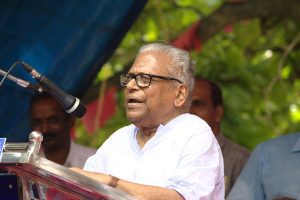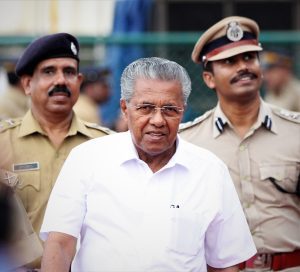Lawyers say KAAPA is more draconian than UAPA, which is also being increasingly used by the Pinarayi Vijayan government.

Leader of the Opposition in Kerala, VD Satheesan, has said his party is strongly against any move to charge political activists with laws like KAAPA (Facebook/Satheesan)
The Kerala government has taken steps to invoke KAAPA (Kerala Anti-Social Activities Prevention Act) against a Youth Congress worker who raised slogans against Chief Minister Pinarayi Vijayan inside an IndiGo flight in June.
The Kannur City Police Commissioner Ilango R is reported to have recommended the use of KAAPA against the protestor, Farzeen Majid, to the Deputy Inspector General of Police (DIG), and branded the Youth Congress Mattannur block president a “habitual offender”.
This is not the first case where KAAPA has been used against a political activist, and many are apprehensive that its use could become a trend. It comes at a time when the number of cases registered by the Pinarayi Vijayan government under the UAPA or Unlawful Activities (Prevention) Act has been increasing. All this has now led observers to warn that Kerala’s ruling front is beginning to display authoritarian tendencies.
KAAPA was enacted in 2007 by the LDF government when VS Achuthanandan was the chief minister and amended in 2014.
People deemed a threat to society can be booked under it and imprisoned for up to a year without bail; they can also be denied entry to a particular area of jurisdiction for up to one year.
The special Act is considered draconian due to the lack of judicial scrutiny in bringing charges against an individual.

Former Kerala chief minister VS Achuthanandan. KAAPA was enacted in 2007 by the LDF government when Achuthanandan was at the helm. In 2022, KAAPA could be invoked against a political worker by the Pinarayi Vijayan government (Wikimedia Commons)
An advocate in the Kerala High Court, seeking anonymity, explained this flaw. “Usually, all detention is based on judicial intervention, there is a legal check involved. But with KAAPA, it is done by the executive,” he said.
“The police recommend the name of the person to be charged with KAAPA to the district collector, and both are part of the executive.”
Pramod Puzhankara, a political analyst and lawyer based in New Delhi, said KAAPA was “primarily against the fundamental rights” granted by the Constitution.
“If at all a state invokes KAAPA against an individual, there should be solid reasons for it,” Puzhankara told South First. If any such law is invoked against protesters, then it resembles the actions of a totalitarian state, he said.
Earlier, he said, the Act was sparingly used in the state, and only against criminals. “The Act aims to break their networks and check organised crime. Not so anymore.”
Puzhankara said a law cannot be deemed “right” just because it is written in the law books, and that the state should refrain from using it as a political tool.
“KAAPA should be seen in the larger context of state repression now unleashed by the Indian government,” he said. “Look at the abrogation of Article 370 or CAA, are these right laws?”
The Kerala High Court advocate said that the verdicts on granting bail by the Supreme Court do not apply to KAAPA when even “draconian laws” like UAPA have a committee to review it.
“The courts can also question the investigating agency if the UAPA is charged without adequate reasons,” he added.
The Supreme Court in various instances has asserted the importance of bail through its statements and orders.
In July, in Satender Kumar Antil vs Central Bureau of Investigation (CBI), a Supreme Court Bench consisting of Justices Sanjay Kishan Kaul and MM Sundresh reiterated that any non-compliance with Sections 41 and 41A of the Criminal Procedure Code (CrPC) at the time of arrest would entitle the accused to grant of bail.
Section 41 deals with the arrest of persons and Section 41A deals with the procedure for appearance before the police officer.
“The principle that bail is the rule and jail is the exception has been well recognised through the repetitive pronouncements of this court. This again is on the touchstone of Article 21 of the Constitution of India,” the Supreme Court order read.
Recently, Telangana MLA H Raja Singh, arrested for his alleged derogatory remarks against Prophet Muhammad, was given bail by an Additional Chief Metropolitan Magistrate court in Nampally. The court had pointed out that the police had not followed due procedure and served notice to Raja Singh under Section 41A of the CrPC before arresting him.

Kerala Chief Minister Pinarayi Vijayan. Kerala Leader of the Opposition VD Satheesan has questioned why KAAPA was not invoked in cases against leaders of CPI(M)’s Students’ Federation of India. (Wikimedia Commons)
The Congress party has been scathing in its criticism of KAAPA and the Pinarayi Vijayan government following Majid’s arrest.
“I want to humbly remind the chief minister that this is Kerala and not Stalin’s Russia,” Opposition leader in the Assembly VD Satheesan said during an interaction with the media.
“We will strongly object to any move to charge political activists with laws like KAAPA, for waving a black flag at the chief minister or protesting against him. This Act must be revoked at the earliest,” he said.
Satheesan also questioned Pinarayi Vijayan about why KAAPA was not invoked against leaders of the SFI (Students’ Federation of India) — the students’ wing of the CPI(M) — though they have numerous cases against them.
In June, Majid’s protest against Pinarayi Vijayan inside an Indigo flight along with another activist, Naveen Kumar, had led to them being put on IndiGo’s no-flyer list.
While it is true that Majid has several cases against him, the Congress has pointed out that most of them are of a political nature and should not have been used as an excuse to invoke KAAPA.

May 01, 2024

May 01, 2024

May 01, 2024

May 01, 2024

May 01, 2024

Apr 30, 2024